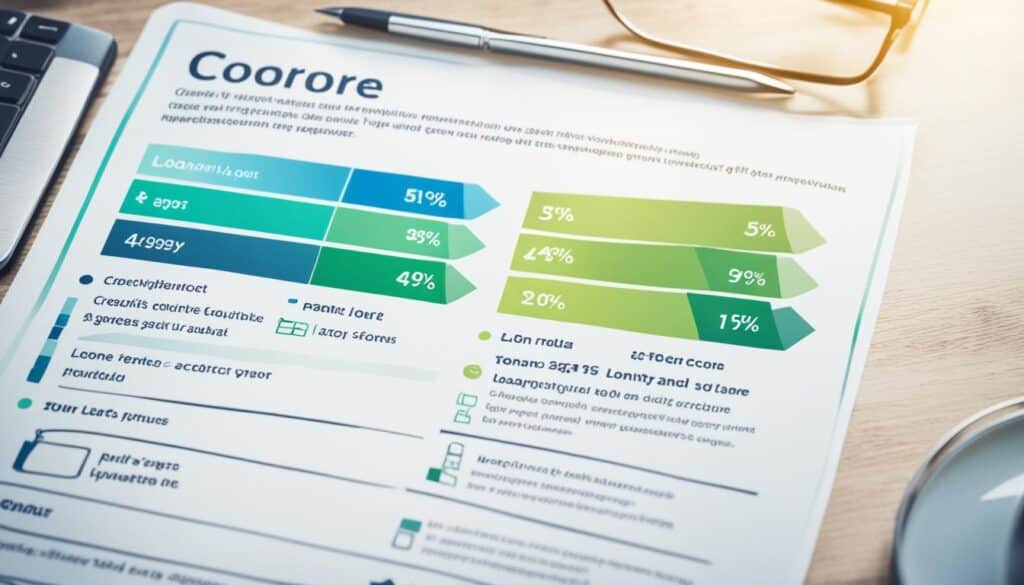Are you a homeowner looking for the best home equity loan options? Look no further. Unlock offers a unique and beneficial solution that allows you to access your equity with a Home Equity Agreement (HEA). With Unlock, you can tap into your home’s equity for various purposes such as home renovations, debt consolidation, or investment opportunities.
Unlock has built a strong reputation for its streamlined process and customer satisfaction. Our satisfied customers have praised the simplicity and efficiency of Unlock’s home equity loan options, making it the top choice for homeowners seeking to make the most of their home equity.
Key Takeaways:
- Unlock offers a unique Home Equity Agreement (HEA) that allows homeowners to access their equity.
- Customers can use Unlock’s home equity loan options for various purposes such as home renovations and debt consolidation.
- Unlock has a strong reputation for its streamlined process and customer satisfaction.
- By choosing Unlock, homeowners can unlock the best home equity loan options available.
- Take advantage of Unlock’s top-notch customer service to guide you through the process and find the perfect home equity loan option for you.
Understanding Home Equity Loans
A home equity loan is a second mortgage that enables homeowners to borrow against the value of their home, excluding their existing mortgage. This type of loan allows homeowners to tap into their home’s equity for various purposes, such as funding home improvements, consolidating debts, or financing higher education.
Qualifications and application processes for home equity loans may vary among lenders. It’s important for homeowners to understand the requirements and compare offers from different financial institutions to find the best fit for their needs.
Home Equity Loan Qualifications
To qualify for a home equity loan, homeowners typically need:
- A minimum credit score of 620 or higher
- A debt-to-income ratio below a certain threshold (usually around 43%)
- A loan-to-value ratio (LTV) that meets the lender’s requirements
- Proof of income and employment stability
Note that these are general guidelines, and specific qualifications may vary depending on the lender and individual financial circumstances.
Applying for a Home Equity Loan
When applying for a home equity loan, homeowners should be prepared to provide the following documentation:
- Proof of identity (such as a driver’s license or passport)
- Proof of home ownership (property deed or mortgage statement)
- Income verification (recent pay stubs, tax returns, or bank statements)
- Appraisal or assessment of the property
- Information about existing debts and monthly obligations
It’s important to gather all the necessary documentation before starting the application process to ensure a smooth and efficient experience.
Finding the Best Bank for a Home Equity Loan
When searching for the best bank for a home equity loan, homeowners should consider the following factors:
- Interest rates: Compare rates from different banks to find the most competitive offer.
- Fees: Take into account any origination fees, closing costs, or other charges associated with the loan.
- Customer service: Research the bank’s reputation for customer satisfaction and responsiveness.
It’s also beneficial to explore reviews and recommendations to gauge the experiences of other borrowers.
Home Equity Loan Calculator
Using a home equity loan calculator can be a valuable tool for homeowners. This calculator helps estimate the borrowing potential and repayment terms of a home equity loan. By entering information such as the loan amount, interest rate, and repayment period, homeowners can better understand the financial implications of their borrowing decision.
While a home equity loan calculator provides useful estimates, it’s important to note that the actual terms and conditions of the loan may vary. Homeowners should consult with lenders directly for accurate and personalized information.
Best Home Equity Loan Lenders of 2024
When it comes to finding the best home equity loan lender, it’s important to consider reputable sources that have thoroughly reviewed and rated lenders. At NerdWallet, we have done the research for you, providing a list of the top home equity loan lenders for 2024. These lenders offer a range of options, including home equity lines of credit (HELOCs) and home equity loans, allowing borrowers to tap into the value of their homes.
Whether you’re looking to consolidate debt, fund a home renovation, or cover unexpected expenses, these lenders offer competitive rates and flexible terms to suit your specific needs. By comparing different lenders, you can find the best loan option for your home loan requirements.
Top Home Equity Loan Lenders
| Lender | Loan Type | Interest Rate | Loan Amount |
|---|---|---|---|
| ABC Bank | Home Equity Line of Credit (HELOC) | 3.25% | $25,000 – $500,000 |
| XYZ Credit Union | Home Equity Loan | 3.50% | $50,000 – $1,000,000 |
| 123 Mortgage | Fixed-Rate Home Equity Loan | 3.75% | $10,000 – $250,000 |
These lenders have a proven track record of providing excellent service and competitive rates for home equity loans. By partnering with reputable lenders, you can confidently navigate the process of securing a loan and unlock the potential of your home’s equity.
Remember, it’s important to carefully review and compare the terms and conditions offered by different lenders before making a decision. By thoroughly researching the various options available, you can find the loan lender that offers the most favorable terms and conditions for your specific financial situation.

So, if you’re in the market for a home equity loan, take the time to explore the options provided by these top lenders. By choosing a reputable and reliable lender, you can confidently apply for a home equity loan and unlock the financial benefits that your home’s equity has to offer.
How a Home Equity Loan Works
As homeowners make monthly mortgage payments, they build equity in their homes. A home equity loan allows them to borrow against this equity, receiving the loan amount in a lump sum.
The amount that can be borrowed depends on various factors, including the homeowner’s credit score, the chosen lender, and the loan-to-value ratio, which is the percentage of the home’s value that the loan represents.
When applying for a home equity loan, borrowers need to consider the interest rate offered by different home equity loan lenders. The interest rate determines the cost of borrowing and affects the monthly payments. Generally, a lower interest rate means lower monthly payments and overall loan costs.
It’s essential to compare offers from different lenders to find the best interest rate for a home equity loan. Credit unions, banks, and online lenders are among the options borrowers can consider.
For example, Navy Federal Credit Union is known for providing competitive rates and flexible terms. Its home equity loan program allows borrowers to leverage their home’s value for various purposes, from home renovations to debt consolidation.
Credit score is another crucial factor that affects the interest rate and loan terms. Lenders typically offer more favorable rates to borrowers with higher credit scores, as they are considered less risky. Borrowers with lower credit scores may still be eligible for a home equity loan, but they might face higher interest rates or additional requirements.
To illustrate how a home equity loan works, let’s consider an example:
John and Mary own a home valued at $400,000, and they have paid off $250,000 of their mortgage. They are considering a home equity loan to fund a home renovation project.
Based on their credit score and the loan-to-value ratio, they qualify for a home equity loan with an interest rate of 4.5%.
The loan amount they can receive is determined by subtracting their outstanding mortgage balance ($250,000) from a certain percentage of their home’s value (e.g., 80%).
In this case, they can borrow up to $70,000 ($400,000 x 80% – $250,000) using a home equity loan.
They will repay the loan in fixed monthly installments over a specific term, such as 10 years. Each payment includes both principal and interest.
Having a clear understanding of how a home equity loan works can help homeowners make informed decisions about borrowing against their home equity.
Home Equity Loan Process
The process of obtaining a home equity loan typically involves the following steps:
- Evaluate your financial situation: Assess your home’s value, calculate your equity, and determine your borrowing needs.
- Research lenders: Compare offers from different home equity loan lenders, considering factors such as interest rates, loan terms, fees, and customer reviews.
- Preparation: Gather necessary documents, such as proof of income, tax returns, and property information.
- Apply for a loan: Submit your application to the chosen lender, including details about your home, credit score, and desired loan amount.
- Loan processing: The lender will review your application, verify the information, and may conduct an appraisal of your property.
- Loan approval and terms: If approved, you will receive the loan offer, including the interest rate, loan amount, repayment term, and any associated fees.
- Closing: Sign the loan agreement and any other required documents. Be sure to review and understand all terms before signing.
- Funding: After closing, the lender will disburse the loan funds to you in a lump sum or in the method specified in the loan agreement.
- Repayment: Make regular monthly payments according to the loan terms until the loan is fully repaid.
Understanding the home equity loan process can help you navigate the application and ensure a smooth borrowing experience.

Alternatives to Home Equity Loans
While home equity loans are a popular option for accessing the equity in your home, there are alternatives available that may better suit your needs. Two common alternatives are home equity lines of credit (HELOCs) and cash-out refinances.
Home Equity Lines of Credit (HELOCs):
A HELOC is a line of credit that allows you to borrow against the equity in your home. Unlike a home equity loan, where you receive a lump sum of money, a HELOC provides you with a set credit limit that you can draw from as needed. With a HELOC, you have more flexibility in using the funds for various purposes, such as home renovation projects or consolidating high-interest debt.
Cash-Out Refinances:
A cash-out refinance involves replacing your existing mortgage with a new loan that has a higher balance. The difference between the old and new mortgage amounts is paid out to you in cash. This option allows you to tap into the equity in your home and use it for any purpose you choose. Cash-out refinances are often used for home renovations, debt consolidation, or other financial needs.
Both HELOCs and cash-out refinances can be viable alternatives to home equity loans, depending on your specific financial goals and circumstances. It’s important to carefully consider the terms, interest rates, and repayment plans offered by lenders before making a decision.
“When considering alternatives to home equity loans, it’s crucial to weigh the benefits and drawbacks of each option. Determine which one aligns best with your financial objectives and provides the most favorable terms.”
Using Home Equity for Home Renovation
If you’re planning a home renovation project, both HELOCs and cash-out refinances can be advantageous. With a HELOC, you have the flexibility to access funds as you need them, allowing for better control over your project’s budget. On the other hand, a cash-out refinance provides a lump sum that can be used for larger, upfront expenses.
Before deciding on an alternative to a home equity loan, carefully consider your financial situation, the amount of equity in your home, and the specific purpose for which you need the funds. Evaluating the options available to you and comparing rates and repayment terms from different lenders can help you make an informed decision.
Comparing Home Equity Loan Alternatives
| Loan Option | Pros | Cons |
|---|---|---|
| Home Equity Line of Credit (HELOC) |
|
|
| Cash-Out Refinance |
|
|
When considering alternatives to home equity loans, it’s essential to evaluate the pros and cons of each option and how they align with your specific financial needs and goals. Consulting with a financial advisor or lender can provide additional guidance and help you make an informed decision.

Tips for Securing a Lower Home Equity Loan Rate
When considering a home equity loan, securing a lower interest rate can save you money in the long run. Here are some tips to help you get the best rate:
- Check and Improve Your Credit Score: Lenders consider credit scores when determining loan rates. Before applying, review your credit report for errors and take steps to improve your score, such as paying down debt and making timely payments.
- Compare Quotes from Multiple Lenders: Don’t settle for the first offer you receive. Shop around and request quotes from different lenders to compare interest rates, closing costs, and loan terms. This will give you a better idea of the options available to you.
- Consider a Home Equity Line of Credit (HELOC): Instead of a traditional home equity loan, you may want to explore a HELOC. A HELOC offers a line of credit that you can borrow from as needed, potentially allowing for more flexibility in your borrowing and repayment terms.
- Wait for a Lower Loan-to-Value Ratio: Building more equity in your home can improve your loan-to-value ratio and potentially qualify you for a lower interest rate. Consider waiting to apply for a home equity loan until you have a higher percentage of equity in your home.
- Ask Lenders About Available Discounts: Some lenders offer discounts on home equity loans for specific reasons, such as debt consolidation or certain loan amounts. Inquire about any available discounts that may help lower your interest rate.

If you follow these tips, you’ll be on your way to securing a lower home equity loan rate and saving money on your loan. Remember to thoroughly research your options, compare offers, and choose the loan option that best fits your financial goals.
Is a Home Equity Loan Worth It?
Whether a home equity loan is worth it depends on individual circumstances and needs. Homeowners have the option to borrow against the equity in their homes based on appraised values, taking into account factors such as the loan-to-value ratio. A home equity loan, also known as a second mortgage, provides access to funds with different terms and rates than the primary mortgage.
When considering whether a home equity loan is worth it, homeowners should carefully assess their financial goals and evaluate the potential benefits and drawbacks of this type of loan. Some key factors to consider include:
- Loan Purpose: Determine whether the loan will be used for a valuable purpose, such as home renovations, debt consolidation, or education expenses.
- Loan Amount: Consider the amount of equity available and the specific financial needs to determine if borrowing against the equity is necessary.
- Interest Rates: Compare the interest rates of different lenders to ensure you secure the lowest home equity loan rate possible.
- Repayment Plan: Evaluate the repayment terms and monthly payments to ensure they align with your budget and financial capabilities.
By carefully assessing these factors and conducting thorough research, homeowners can make an informed decision about whether a home equity loan is worth pursuing.
“A home equity loan can be a powerful financial tool, allowing homeowners to tap into the value they have built in their homes for various purposes. However, it is essential to carefully consider the potential risks and rewards before committing to this type of loan.”
Now, let’s look at some key considerations when deciding whether a home equity loan is worth it.
Loan Purpose
The purpose of the loan plays a crucial role in determining its worthiness. Homeowners should evaluate whether the loan will be used for a valuable purpose that can potentially provide long-term benefits. Common reasons for borrowing against home equity include:
- Home Renovations: Using the funds to make improvements or additions to the property, which can increase its value.
- Debt Consolidation: Consolidating high-interest debts into a single loan with a lower interest rate, potentially saving money on interest payments.
- Education Expenses: Funding higher education costs for yourself or a family member, which can lead to improved job prospects and earning potential.
By ensuring that the loan serves a valuable purpose, homeowners can make a more confident decision about its worthiness.
Loan Amount
The loan amount is another important consideration when evaluating the worthiness of a home equity loan. Homeowners should assess the amount of equity available in their homes and determine if borrowing against it is necessary. It’s crucial to strike a balance between obtaining the desired funds and not overextending oneself financially.
Homeowners should also consider whether there are alternative financing options available that require a lower loan amount or offer more favorable terms.
Interest Rates
Interest rates play a significant role in the affordability of a home equity loan. Homeowners should carefully compare interest rates offered by different lenders to secure the lowest home equity loan rate possible. A lower interest rate can result in substantial savings over the life of the loan.
It’s important to note that interest rates can vary based on a homeowner’s creditworthiness, loan amount, and the lender’s policies. By shopping around and considering multiple offers, homeowners can increase their chances of securing a favorable interest rate.
Repayment Plan
Assessing the repayment plan and monthly payments is crucial when evaluating the worthiness of a home equity loan. Homeowners should carefully review the loan’s terms and ensure that the repayment schedule aligns with their budget and financial capabilities.
If the monthly payments are too high or the loan term is too short, it could strain the homeowner’s finances. On the other hand, longer loan terms may result in higher overall interest payments.
It’s essential to determine a repayment plan that strikes the right balance between manageable monthly payments and a reasonable loan term.

Understanding Home Equity Loan Rates
When considering a home equity loan, it’s important to understand the various factors that can impact the interest rates offered by lenders. Home equity loan rates can vary significantly among different lenders, and the rate you are offered can depend on factors such as the type of loan product, the length of the loan, and even the specific credit union or lender you choose.
One of the key factors that can affect the interest rates on home equity loans is the loan product itself. Different lenders may offer different loan products, each with its own set of terms and conditions. For example, some lenders may offer fixed-rate home equity loans, where the interest rate remains the same for the entire life of the loan. Others may offer adjustable-rate loans, where the interest rate can change over time.
Did you know? Research shows that homeowners who choose fixed-rate home equity loans often feel more secure and confident in their repayment plans, as they can accurately budget for the monthly payments without worrying about fluctuations in interest rates.
Another factor that can impact home equity loan rates is the length of the loan. Typically, home equity loans have terms ranging from five to 30 years. The longer the term of the loan, the higher the interest rate may be. This is because lenders perceive longer-term loans as carrying more risk. Conversely, shorter-term loans may come with lower interest rates.
Additionally, the specific credit union or lender you choose can also affect the interest rate you are offered. Different lenders have different risk appetites and lending criteria, which can result in varying interest rates for the same loan amount and borrower profile. It’s essential to shop around and compare rates from many lenders to ensure you are getting the best rate for your home equity loan.
Pro Tip: Comparing rates from many lenders can save you thousands of dollars over the life of your loan. Even a small difference in interest rates can have a significant impact on your monthly payments and the overall cost of borrowing.
In conclusion, understanding home equity loan rates is crucial for making informed financial decisions. By considering factors such as the loan product, the length of the loan, and the lender you choose, you can increase your chances of securing a lower interest rate and ultimately find the best rate for your home equity loan.
Factors Affecting Home Equity Loan Rates
| Factor | Description |
|---|---|
| Type of Loan Product | Different loan products may come with varying interest rates. Fixed-rate loans offer stability, while adjustable-rate loans can change over time. |
| Length of the Loan | The term of the loan can affect the interest rate. Longer-term loans may come with higher rates, while shorter-term loans may have lower rates. |
| Lender | Different lenders may offer different rates based on their risk appetite and lending criteria. Shopping around and comparing rates is crucial to finding the best rate. |

The Benefits of a Home Equity Loan
Home equity loans offer numerous benefits, making them a popular choice among homeowners. One of the key advantages is the fixed interest rate, which provides borrowers with predictable monthly payments and greater financial stability. Rather than worrying about fluctuating interest rates, homeowners can plan their budget effectively.
Applying for a home equity loan is a straightforward process. Lenders consider the appraised value of your home and the amount of equity you have built up over time. This allows you to access a loan amount that aligns with the value of your home, providing you with the funds you need.
Once you have secured a home equity loan, you have the flexibility to use the funds for various purposes. Whether you want to make home improvements, consolidate debt, or cover other financial needs, a home equity loan allows you to tap into the value of your property to achieve your goals.
“A home equity loan provides homeowners with access to funds based on the value of their property, offering greater financial flexibility and potential for growth.”
By leveraging the equity in your home, you can make strategic financial decisions that align with your long-term goals. The ability to use the loan amount for multiple purposes makes it a versatile and valuable financial tool.
Example: Ways to Use a Home Equity Loan
Here are some common ways homeowners use their home equity loan:
- Home renovations and improvements
- Consolidating high-interest debt
- Investing in education or starting a business
- Emergency expenses or unforeseen medical costs
- Down payments on new properties or real estate investments
With these diverse options, a home equity loan empowers homeowners to make strategic financial decisions with confidence.

| Benefits of a Home Equity Loan |
|---|
| Predictable monthly payments with a fixed interest rate |
| Access funds based on the value of your home |
| Flexibility to use the loan amount for various purposes |
The Process of Obtaining a Home Equity Loan
Obtaining a home equity loan involves applying for a new loan based on the value of your home and the amount of equity you have built. Whether you’re looking for funds to renovate your home or consolidate debt, understanding the process is crucial to make informed decisions.
First, start by researching online lenders that offer home equity loans. Compare loan offers from different lenders to find the best terms, including lower interest rates and favorable repayment options. Take into account factors such as the loan amount, interest rate, and loan term when evaluating your options. It’s important to find a lender that suits your financial needs and offers flexibility in repayment terms.
When applying for a home equity loan, lenders often require excellent credit and other qualifications. Having an excellent credit score is beneficial as it demonstrates your ability to manage debt responsibly. Lenders may also consider factors such as your debt-to-income ratio and the value of your home.
Benefits of Obtaining a Home Equity Loan:
- Competitive interest rates: Home equity loans usually offer lower interest rates compared to other forms of credit, such as personal loans or credit cards.
- Flexibility in repayment: Depending on the loan terms, you may have the option to repay the loan over a longer period, making it more manageable for your budget.
- Potential tax advantages: In certain situations, the interest paid on a home equity loan may be tax-deductible. Consult with a tax professional to understand your eligibility.
- Access to higher loan amounts: With a home equity loan, you can typically borrow larger amounts compared to other forms of borrowing.
Ensure that you carefully review the terms and conditions of the loan, including any fees or closing costs associated with the process. It’s essential to understand your rights and responsibilities as a borrower.
Remember to borrow responsibly and only what you can comfortably repay. Defaulting on a home equity loan can result in the loss of your home.
By taking the time to research, compare rates, and assess your financial situation, you can secure a home equity loan that meets your needs. This loan can provide the financial flexibility to achieve your goals, whether it’s home improvements or consolidating high-interest debt.

| Lender | Interest Rate | Loan Amount | Loan Term | Requirements |
|---|---|---|---|---|
| Lender A | 3.25% | $50,000 | 10 years | Excellent credit |
| Lender B | 3.50% | $75,000 | 15 years | Excellent credit, proof of income |
| Lender C | 4.00% | $100,000 | 20 years | Excellent credit, low debt-to-income ratio |
Home Equity Loan Rate Factors
When considering a home equity loan, it’s essential to understand the factors that can influence the loan’s interest rate. By familiarizing yourself with these factors, you can make informed decisions and potentially secure the most favorable terms for your loan.
Credit History
Your credit history plays a significant role in determining the interest rate of your home equity loan. Lenders use your credit score and credit report to assess your creditworthiness and determine the level of risk involved in lending to you. A higher credit score indicates a lower risk, which may result in a lower interest rate.
Also Read : Expert Student Loan Planner Guidance & Tips
Loan Term
The loan term refers to the duration in which you will repay the home equity loan. Typically, home equity loans have terms ranging from five to 30 years. The length of the loan term can impact the interest rate. Shorter loan terms often come with lower interest rates, while longer terms may have slightly higher rates.
Market Rates
Interest rates for home equity loans can vary based on the current market conditions. These rates are influenced by factors such as economic trends, inflation, and the Federal Reserve’s monetary policies. It’s important to stay updated on market rates and compare offers from different lenders to secure the most competitive rate.

Comparing Offers
When seeking a home equity loan, it’s crucial to shop around and compare offers from multiple lenders. Different lenders may have varying interest rates and loan terms, so taking the time to explore your options can help you find the most favorable terms for your specific needs.
The annual percentage rate (APR) is an important metric to consider when comparing loan offers. The APR includes not only the interest rate but also any additional fees or charges associated with the loan. It provides a comprehensive view of the total cost of borrowing.
By considering the factors mentioned above and comparing offers from different lenders, you can make an informed decision and secure a home equity loan with favorable rates and terms.
Conclusion
When it comes to finding the best home equity loan, thorough research and comparison of lenders is essential. In 2024, NerdWallet has identified some of the top home equity lenders, including Navy Federal Credit Union, which offers competitive rates and excellent customer service. These lenders not only provide home equity loans but also offer other financial products like mortgage loans and auto loans.
By considering various lenders and their offerings, homeowners can make informed decisions that align with their financial goals and needs. Whether it’s obtaining the lowest home equity loan or finding the best home equity lender, borrowers should carefully analyze factors such as interest rates, repayment terms, and fees. It’s important to remember that each lender has its own eligibility criteria and loan options.
Among the many home equity lenders available, Navy Federal Credit Union stands out for its reputation and dedication to customer satisfaction. However, it’s always advisable to compare multiple lenders to ensure you’re getting the best deal. With the right lender and loan product, homeowners can access the equity in their homes and use it for a range of purposes, such as home renovations, debt consolidation, or investment opportunities.
FAQ
Q: What is a home equity loan?
A: A home equity loan is a type of loan that allows you to borrow against the equity in your home.
Q: How does a home equity loan differ from a home loan?
A: A home equity loan is a separate loan from your original mortgage, allowing you to borrow against the equity you’ve built up in your home.
Q: What is a home equity line of credit (HELOC)?
A: A HELOC is a revolving line of credit that is secured by the equity in your home, giving you access to funds as needed.
Q: How can I get a home equity loan?
A: To get a home equity loan, you can apply through a bank, credit union, or online lender. You will need to have equity in your home and meet the lender’s credit requirements.
Q: What are some factors to consider when choosing a home equity lender?
A: When choosing a home equity lender, consider factors such as the interest rate, loan terms, fees, and reputation of the lender.
Q: Can I use my home equity loan for any purpose?
A: Yes, you can typically use a home equity loan for any purpose, such as home improvements, debt consolidation, or other large expenses.
Q: What are the advantages of using a credit union for a home equity loan?
A: Credit unions may offer competitive rates and personalized service for home equity loans. They may also have lower fees compared to traditional banks.




